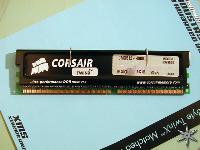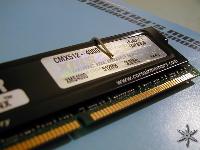After careful consideration I have decided to transfer all hardware review activities to a new domain. I purchased Hardwareasylum.com in 2012 and have been working hard to build a new and improved Ninjalane on that domain. If you are reading this you have reached one of the archived articles, news, projects and/or reviews that were left behind during the site migration.
Please update your bookmarks and be sure to visit the new and improved Ninjalane at Hardwareasylum.com
Corsair XMS4000 Twinx Memory Review
Author: Dennis Garcia
Published: Sunday, August 17, 2003
Introduction
When computer users gather around the virtual campfire to swap stories about mid-air rail gibs and argue about whom really got the highest score some computer related questions always seem come up. Questions like, "what processor are you running?" or "What do you have your video card clocked at?" are pretty common since those are the easiest to answer. Rarely does anyone have questions about memory though the basic rule of thumb is to get the fastest memory you can afford, or is it?
In this review we will be looking at one of the latest offerings from Corsair the XMS4000 TwinX1024. TwinX memory modules are pretty special in that the chips used are hand picked from the same memory "lot" and tested in pairs to their rated speed. If the modules pass the rigorous screening process they are assigned a TwinX number and packaged together.
Here is a quote from the Corsair Press Release
" Moreover, the company developed a stringent battery of tests which every XMS module built must pass at its rated speed before being shipped. XMS4000 modules are tested at 500MHz with 3-4-4-8 latency settings at 2.75V. All XMS4000 modules are tested in an Asus P4C800 dual channel DDR motherboard based on the Intel 875P "Canterwood" chipset. TwinX kits are tested as a matched pair and physically packaged together immediately after passing test, guaranteeing that the customer receives a product that has been verified in the dual channel environment."
Follow the link to read the entire press release. http://www.corsairmicro.com/main/PR_xms4000.html
In this review we will be looking at one of the latest offerings from Corsair the XMS4000 TwinX1024. TwinX memory modules are pretty special in that the chips used are hand picked from the same memory "lot" and tested in pairs to their rated speed. If the modules pass the rigorous screening process they are assigned a TwinX number and packaged together.
Here is a quote from the Corsair Press Release
" Moreover, the company developed a stringent battery of tests which every XMS module built must pass at its rated speed before being shipped. XMS4000 modules are tested at 500MHz with 3-4-4-8 latency settings at 2.75V. All XMS4000 modules are tested in an Asus P4C800 dual channel DDR motherboard based on the Intel 875P "Canterwood" chipset. TwinX kits are tested as a matched pair and physically packaged together immediately after passing test, guaranteeing that the customer receives a product that has been verified in the dual channel environment."
Follow the link to read the entire press release. http://www.corsairmicro.com/main/PR_xms4000.html
Someone came to me the other day asking a specific memory question, "What is better to have, higher memory clock speed? or ultra low memory timings?" What a good question, as we all know this is really dependent on your hardware, namely motherboard and processor though the big question is, "how fast of memory are we talking?"



